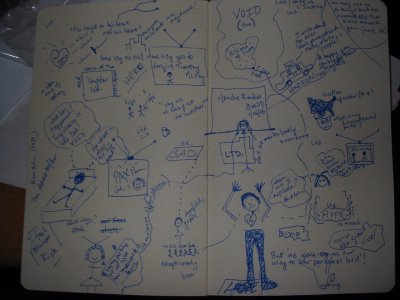
I am a hippy, and still all about love even in the face of "systemic poverty and religious idiocy" (See Rod's helpful comment on January 27 to "guilt justice traffic"). I believe that one reason systemic poverty and religious idiocy can occur here in the US, for example, is because for the majority of us folks here in Bourgeois Hell they are both abstract concepts--as are war and violence. I don't mean that such things are not real, I mean that the suburbs in the US are structured so that we will have to live in them someday and not have to be directly connected to systemic poverty, violence, etc. Guy DeBord says:
"The spectacle is not a collection of images; it is a social relation between people that is mediated by images." and also "The concept of 'the spectacle' interrelates and explains a wide range of seemingly unconnected phenomena. The apparent diversities and contrasts of these phenomena stem from the social organization of appearances, whose essential nature must itself be recognized. Considered in its own terms, the spectacle is an affirmation of appearances and an identification of all human social life with appearances. But a critique that grasps the spectacle's essential character reveals it to be a visible negation of life--a negation that has taken on a visible form."
I feel like the Perley in the Silent Partner, by Elizabeth Stuart Phelps when she tells her husband, the evil evil mill-guy, "There is something in this matter that neither of you touch...There is something about the relations of rich and poor, of master and man, with which the state of the market has nothing whatever to do." Perley is a woman, obviously, and she spends her time with the children, mothers and babies of the mill. It's her direct physical experience of their bodies and their suffering that triggers her political consciousness, while her husband still prefers to play around with numbers.
The argument of the book is rather simple, and it's hardly even daring (at the end of the book, Perely's "white and calm" presence helps appease striking workers--ugh), but it's emphasis on human bodies and emotional connection seems to me rather relevant. One reason why the war in Iraq is finally becoming unpopular in the US at all is because dead bodies are coming back to the U.S. In the suburbs we don't usually see many bodies--we barely have to deal with the presence of our neighbours, and we certainly don't sit near other people on public transportation. We drive, alone, in our cars.
~
Ideas and Rhythms Work Alike






























